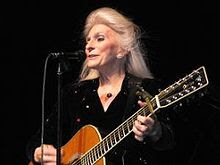I attended a concert last night with Judy Collins. Judith Marjorie "Judy" Collins (born May 1, 1939; Seattle, Washington) is an American folk and standards singer and songwriter, known for her eclectic tastes in the material she records (which has included folk, showtunes, pop, and rock and roll); and for her social activism. The concert was at the The Birchmere, which is a well-known, intimate concert hall in Alexandria, Virginia, known for presenting performers in the bluegrass, country, folk, and jazz genres. The main stage has table seating with dinner service. The room seats 500 people and the tables in front are about two feet from the stage. Ms. Collins appeared on stage with big white hair. I liked it because I haven’t seen many mature women who are willing to let their hair be white and long (other than Emmylou Harris).
I have always liked Judy Collins although as I matured, her voice struck me as shrill, particularly in the high end. But her songs were compelling, telling stories of love, loss, remembrance, joy, and sorrow. Collins spent about 10 minutes reminiscing about the 1960s and early 1970s. She knew everyone who was anyone in music during that time. Her memories touched on the era when folk music was in the ascendency, especially as it related to the Vietnam War. She also touched on her drug use, which during the 60s, included the use of LSD. Later she developed a major alcohol problem.
Ms. Collins voice was sometimes unstable, especially as she sang in the lower registers, and when she played the piano and sang at the same time. I suspect it had to do with being seated where breathing can be more difficult. Her rendition of Leonard Cohen’s “Bird on a Wire” was particularly pitchy. She also had sporadic difficulties with remembering lyrics. Simon Cowell would not have been happy, but Ms. Collins is 70-years old and if her voice and memory are dimmer, it was ok with me and the rest of the audience.
One of Ms. Collins songs, “The Blizzard”, is a tedious song that drones and whines about a Colorado snow storm. It was a low point for the evening. She also sang Joan Baez’s “Diamonds and Rust”, which is an angry and unpleasant song. On the other hand, Ms. Collins sang her sublime “Since You Asked.”
What I'll give you since you asked
Is all my time together;
Take the rugged sunny days,
What I'll give you since you asked
Is all my time together;
Take the rugged sunny days,
The warm and rocky weather,
Take the roads that I have walked along,
Looking for tomorrow's time,
Peace of mind.
As my life spills into yours,
Changing with the hours
Filling up the world with time,
Turning time to flowers,
I can show you all the songs
That I never sang to one man before.
We have seen a million stone lying by the water,
You have climbed the hills with me
To the mountain shelter.
Taken off the days, one by one,
Setting them to breathe in the sun.
Take the lilies and the lace
From the days of childhood,
All the willow winding paths
Leading up and outward.
This is what I give
This is what I ask you for;
Nothing more,
She also sang her beautiful and sentimental “Secret Garden”:
My grandmother's house is still there
But it isn't the same
A plain wooden cottage
A patch of brown lawn
And a fence that hangs standing
And sighing in the Seattle rain
I drive by with strangers
And wish they could see what I see
A tangle of summer birds
Flying in sunlight
A forest of lillies
An orchard of apricot trees
Secret Gardens of the heart
Where the flowers bloom forever
I see you shining through the night
In the ice and snow of winter
Great grandfather's farm is still there
But it isn't the same
The barn is torn down
And the fences are gone
The Idaho wind blows
The topsoil away every Spring
I still see the ghosts
Of the people I knew long ago
Inside the old kitchen
They bend and sigh
My life passed them up
And the world passed them by
Secret Gardens of the heart
Where the old stay young forever
I see you shining through the night
In the ice and snow of winter
But most of all
It is me that has changed
And yet I'm still the same
That's me at the weddings
That's me at the graves
Dressed like the people
Who once looked so grown-up and brave
I look in the mirror
Through the eyes of the child that was me
I see willows bending
The season is Spring
And the silver blue sailing birds
Fly with the sun on their wings
Secret Gardens of the heart
Where dreams live on forever
I see you shining through the night
In the ice and snow of winter
It was a great evening with a classic artist who tells stories about our lives. It was a treat to see her and to hear her.













